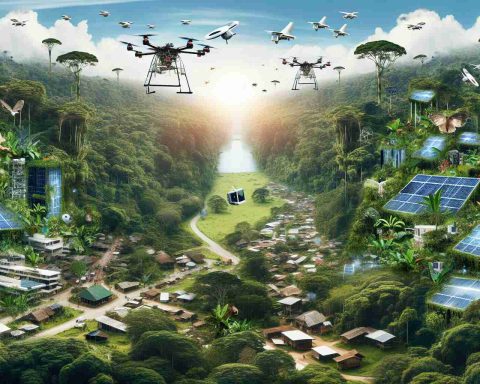In a bustling city like Taichung, fostering a culture of technological ingenuity from a young age is paramount. Recently, the “Robotics and AI Creativity Camp” embarked on its fifth year, attracting over 800 middle and elementary school students to showcase their talents at the Taichung World Trade Center.
The educational event, organized by the City Education Bureau in collaboration with the AI Grasping Society and the Society of Innovation Education and Technology, featured a three-day training program culminating in an exciting “AI Robotics Creative Programming Competition.”
Unlike the conventional learning methods, this competition challenged students to unleash their creativity by designing program languages to command robots in completing various tasks. The competition encompassed cutting-edge AI programs like ChatGPT, Bing, and Leonardo.AI, engaging students in bilingual word battles, AIoT self-driving car challenges, ALGC picture book creations, and unmanned aerial football matches.
Encouraging collaboration and problem-solving, students were urged to think outside the box, igniting their passion for learning and innovation. Esteemed guests such as Legislator Liao Weixiang and Councilor Huang Xinhui graced the event to show support for the young talents.
Looking ahead, the organizers expressed their commitment to expanding the competition, introducing new challenges like drone soccer matches to provide students with a more enriching learning environment.
As the realms of artificial intelligence continue to evolve, nurturing a generation of ethical and skilled technologists is imperative. By merging practical learning with AI technologies, students are not only changing the way they learn but also broadening their horizons, laying a solid foundation for future technological advancements.
Empowering Future Innovators through Robotics and AI Competitions: Unveiling Key Insights
In the realm of empowering future innovators through robotics and AI competitions, there exist vital questions that shed light on the impact and challenges within this evolving landscape.
What are the significant benefits of engaging students in robotics and AI competitions?
Engaging students in robotics and AI competitions fosters a hands-on approach to technology, nurturing problem-solving skills, creativity, and collaboration. These competitions provide a platform for students to apply theoretical knowledge in practical settings, preparing them for future careers in the rapidly advancing tech industry.
What key challenges or controversies are associated with robotics and AI competitions?
One of the challenges faced in robotics and AI competitions is ensuring accessibility and inclusivity for all students, regardless of their background or resources. Additionally, there may be controversies surrounding the ethical implications of AI technology in educational settings, highlighting the importance of addressing ethical considerations in these competitions.
Advantages and Disadvantages of Robotics and AI Competitions
Advantages:
– Fosters innovation and creativity
– Develops critical thinking and problem-solving skills
– Encourages teamwork and collaboration
– Prepares students for real-world applications of technology
Disadvantages:
– Potential for increased competition pressure and stress among students
– Resource limitations may hinder participation for some students
– Ethical concerns regarding the use of AI technology in educational contexts
As the landscape of robotics and AI competitions continues to evolve, it is essential to address these questions and challenges to ensure that students receive a comprehensive and inclusive learning experience.
Suggested related links to main domain:
1. Robotics.org
2. AI.com

















